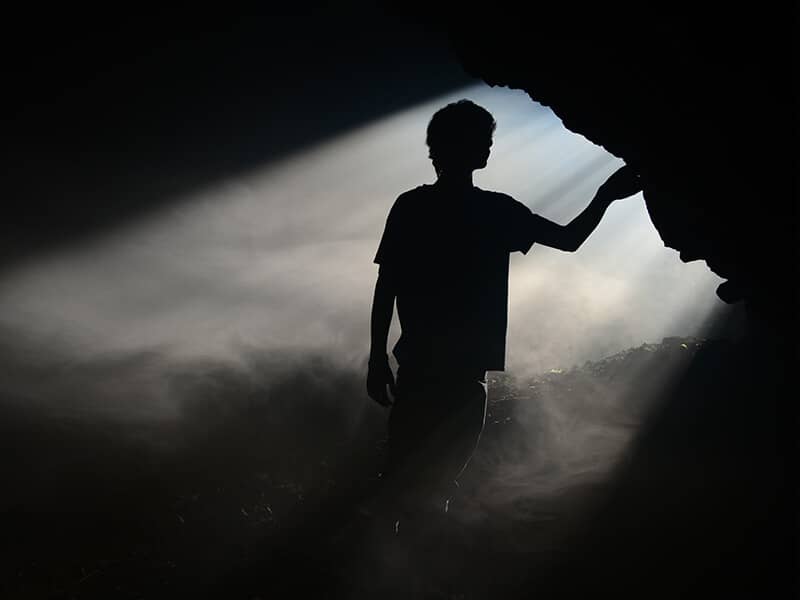
What does it take to become a good steward? The term is referenced in the Bible, but its meaning far extends beyond simply money. It has to do with the heart. Here's an excerpt from Jim Minor's book, Church Shouldn't Suck The Life Out Of You, on stewarding God's way.
At one point in His ministry, Jesus was asked whether it was right for God’s people to pay taxes to Caesar. (See Matthew 22:15–22.) This gets right to the heart of the issue, which is: How should we handle money? Today’s churches struggle with money issues more than anything else. They deliberate over such questions as these: Should we add a new program? Should we make a new hire? Should we construct a new building? Should we increase our missions giving?
To answer the question about taxes, Jesus turned the inquiry around, forcing the questioners to examine their own hearts. He said, “Show Me the tax money.…Whose image and inscription is this?” (Matthew 22:19–20). When they replied that the money bore the image of Caesar, Jesus instructed them to render unto Caesar that which is Caesar’s. (See Matthew 22:21.)
How do we know what belongs to Caesar? We know it does if it bears his image. That which bore Caesar’s image had the power to buy things in the kingdom of Caesar. It was the currency of the Roman Empire. If you wanted a donkey or a home or food, you simply had to take care of your money. That which bore the image of Caesar worked in the economy of the natural world, and even though the style of coin has changed, that truth still applies today. Take good care of your money, and you can enjoy all the things that money can buy.
But there was a second, more important, part to this story: “Render therefore to Caesar the things that are Caesar’s, and to God the things that are God’s” (Matthew 22:21). How do we know what belongs to God? Again, we know because it bears His image. And what is it that bears God’s image? It isn’t a coin or a mountain or a lake or even the stars of the sky. God put His image on something to declare that it belonged to Him—He put his image on mankind. Humanity bears the image of God. (See Genesis 1:27.) In the same way that taking care of that which bears Caesar’s image brings you purchasing power in the kingdom of Caesar, taking care of that which bears God’s image brings you purchasing power in the kingdom of God.
Caring for God’s people racks up credit in the economy of heaven, where the world’s financial rules no longer apply. Caring for God’s people allows us to operate under an open heaven.
Let me give you an example. Eureka is the lady who heads up our Free Indeed food ministry. One of the many local organizations we support is an orphanage called Everyday Blessings. We typically provide them with food on a weekly basis.
One Thursday, Eureka came to me and said, “Pastor, [some people from] Everyday Blessings are here, and they are asking for things that we don’t normally give them—things like toilet paper and napkins and paper towels. We have only enough of that stuff for the church to use. If I give it to them, we won’t have any for the services this weekend.”
I told Eureka, “Here’s what I want you to do: I want you to go into the pantry and give them everything we have. Don’t worry about what the church has or doesn’t have. Let’s just bless them. Give it all.” Then I took her hands in mine, and we prayed and giggled a little bit, and said, “Let’s just see what God does.”
I was scheduled to be out of town for the weekend, so I went ahead and left.
When I returned on Monday, Eureka couldn’t wait to talk to me. She told me that on Friday, she had received a call from someone saying he had some stuff he wanted to give to the church, but someone would need to bring a truck to pick it up. (Man, don’t you love it when people say that?) Sure enough, when she got there with the church’s box truck, the gentleman had a couple of pallets of—guess what?—napkins and toilet paper, enough to wipe every mouth and bottom in all of Sarasota County.
Sometimes, when God tells us to give freely, we think that it contradicts His message of being a good steward. It doesn’t. Being a good steward of God’s money simply means spending it when and where He says, rather than when and where we think we should. We don’t push a roll of toilet paper on everyone who walks in our door, but when the people from Everyday Blessings showed up, one thing was certain: God had already revealed His vision for us to care for them. The fact that they came to our door and asked lined up perfectly with God’s vision—so we didn’t hesitate. We moved forward in His vision, and He provided the provision.
Right now, you might be thinking, Jim, that’s cute—you got some napkins. Tell me another funny chicken tale. Well, hold on. Let me see if this next story gets your attention.
Our church also supports Iris Ministries, founded by Rolland and Heidi Baker in response to their calling to Mozambique, Africa. The last time they came to The Harvest, God really impressed on Peggy and me the importance of shoes to the people to whom the Bakers minister. Few people in Mozambique own shoes, and the result is that infection and disease are widespread. We had never considered the notion of blessing a population of people with footwear, but here was a situation in which God clearly revealed His heart. There was no question that we were to move in that direction, adopting His vision as our own.
I didn’t go and ask how much money we had in the bank or how this could be worked into the budget. (They would have just stared at me, anyway, because we don’t have a budget.) I didn’t look at what we were currently spending and search for areas to cut back so that we could afford some shoes. In fact, I did not see myself at all responsible for the financial aspect of making this happen—the provision was God’s job, not mine.
My job was simply to move forward in making God’s vision become a reality. I presented the idea to our congregation, and within a few short months, we had purchased a forty-foot shipping container and filled it with more than 10,000 brand-new pairs of shoes. The provision for this effort was nothing short of amazing. We had people with next to nothing donate a single pair of shoes, and we had corporations like Skechers donating three thousand pairs.
In addition to the shoes (because God is a God of more than enough), we were also able to provide a new enclosed tent measuring 80 by 160 feet and 50,000 meals. We built the tent in our factory, and the meals were donated to the effort by Feeding Children Everywhere, based in Orlando, Florida.
When we began to move forward in His vision, God caused the word to get out, and before long, all kinds of people and organizations were asking what they could donate to send in our shipping container.
When we finally had the container loaded and about ready, there was still some room, so we started grabbing folding chairs from our church and clothes from our clothing ministry and whatever else we could find to fill it. We might have even stuffed a few small children in there who weren’t paying attention—I’m not sure.
All in all, it ended up costing us about $40,000 to purchase the container, fill it with supplies, and ship it to Mozambique. The entire church caught the fire of God’s vision, and it went from revelation to reality in an incredibly short amount of time. If we had been operating on a budget, obeying the laws of Caesar, we would have looked at this situation and agreed that somebody should do it—that it was a great cause—but, unfortunately, it just couldn’t be us at this time.
Instead, the only concern we had was taking care of those who bear the image of God; and, true to His nature, He provided the provision to make it happen.
While all this was going on, we were also working with the local HUD (Housing and Urban Development) office, through their Neighborhood Stabilization Program, to acquire a number of properties in our neighborhood. As we mentioned earlier, our church buys run-down urban houses, renovates them, and uses them to either expand our rehabilitation programs or offer housing to qualified individuals with low incomes. This is part of the vision God has given us to transform our city. It is a way in which the church can go to the city rather than wait for the city to come to the church.
Anyway, the deal had been structured so that the mortgages on the properties totaled $2.5 million and were to be paid back interest-free beginning in thirty years. I was comfortable with the church assuming this debt, because thirty years would be plenty of time to establish cash flow on the properties. Besides, when thirty years were up, I’d be dead, and it would be my son’s problem to deal with. (That was a joke we told at the time.)
We had just agreed to this deal on the homes when we found out that our shipping container was stuck in customs in Africa. The customs officials were demanding an additional $18,000 for its release! This was way over and above what we had figured, but Peggy and I agreed that we did not want Iris Ministries to incur any burden in receiving the blessing we intended for them. I told her that even if we had to borrow money on our home, we were going to cover the fee. We dug deep, we scraped, and we paid up. This wasn’t one of those times when you find out you need $18,000 and you miraculously receive a check for that amount in the mail. No, this was one of those times when, in order to bless someone through us, God called us to go way beyond what seemed possible, way outside where we expected to go or thought we were capable of going, and really left it up to us to get there. And we did, barely. The container was finally released, along with the blessing that God had planned for Iris Ministries.
Shortly after this, I was sitting in my office when Laura, our church administrator, called me down to look at a letter we had just received from HUD in reference to the properties we had just purchased. In my mind, I was thinking, Man, I sure hope this isn’t about money. Sure enough, it was. The letter from HUD said that they were sorry, but somehow they had misinterpreted the guidelines of the Neighborhood.
Stabilization Program. The $2.5 million in mortgages on the properties would not come due in thirty years, as originally stated. In fact, it would not come due at all. The entire debt had been cancelled. “Have a nice day,” the letter concluded.
Excuse me?
We had to call and verify that one. Sure enough, it was exactly as it appeared to be: God had wiped $2.5 million of debt off our books. Of course, the lady at HUD didn’t credit the Almighty, but we knew better!
In these situations, and in many others over the years, we have caught God’s vision and have received back in abundance. Our motive in giving was never to get; our motive was always to take care of that which bears His image. We gave all we had to Everyday Blessings because the children needed it, and it brought us abundantly more. We stretched beyond what we were financially able to afford in order to send shoes and a tent and meals to Mozambique, all because we were caring for His image-bearers, not because we expected the cancellation of a major debt.
We were simply sowing and reaping the currency of the kingdom of heaven. We were loving people. As God’s church, when we take care of that which bears His image, we operate under an open heaven. We should never sacrifice taking care of those who bear God’s image in order to take care of that which bears Caesar’s image.





